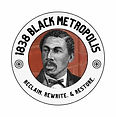We Owe it All to Charles L. Blockson
- 1838 Black Metropolis
- Jun 22, 2023
- 4 min read
Updated: Sep 13, 2023
I am very, very sad to hear of the passing of Charles L. Blockson. I had hoped to meet him someday.

I do believe that nothing that is on this website, none of our walking tours, none of deep dives into The Black Metropolis, would be here were it not for Charles Blockson.

All of our research started with visits to the original archive at the Historical Society of Pennsylvania.

The Historical Society of Pennsylvania is a huge library that has millions of original manuscripts in hundreds of collections.
They have two collections that we believe are sacred foundational documents of The Black Metropolis - the Leon Gardiner Collection and the Pennsylvania Abolition Society Collection.

It is within the Abolition Society Collection that we have the most important statistical snapshot of free Black people prior to the civil war - the 1838 Census.
And it is within the Leon Gardiner Collection that we have the lived experience - the written, documented, proof of Black excellence, Black Resilience, Black Resistance, Black Intellectualism, Black Organizational Power, Black Entrepreneurship, Black Arts; literally all the people in the 1838 Census, and their children, and their children, and their children leading to us now.
The Census is the data. The Collection is the life.
The whole thing is Black Philadelphia’s golden inheritance.
Our Black historians have worked really, really hard, century after century, to protect the valuation of these documents. Documents like The Vigilance Committee notes from 1839, which prove organized Black support for freedom seekers. Or a program from a concert by Frank Johnson in 1837, a document that proves a Black metropolis that appreciated and supported the arts.


Or the notes from the Daughters of Africa, a woman’s Beneficial Society from 1822 that prove women organizing, saving and financially assisting each other through difficult times.

Theophilus Minton, Robert Adger, and William Henry Dorsey were already acting as historians with their own collections in the late 1800s and early 1900s. They decided form the American Negro Historical Society (ANHS) in 1897 to share what they knew and had, and protect the history of the Black Metropolis.

Eventually, Adger’s book collection went to Wellesley College. Dorsey’s scrapbook collection went to Cheyney and is now at Penn State. But everything else went to ANHS member Leon Gardiner.
Leon Gardiner, one of the last members of the ANHS, kept the documents in safe keeping at his home, using them to share Black history with HBCUs, scholars and the local community. In 1934, he entrusted HSP to take care of the documents.
30 years later, Charles Blockson then came in and solidified protection of the documents.

Because when it comes to original document collections, if the institution holding them does not value them, then they may not get processed. If they do not get processed - meaning that they get numbers that identify them, and write ups that summarize what’s in them - then we literally can’t find them. If we can’t find them….we’ve lost our history.
Imagine not knowing that Octavius Catto created the Pythians baseball league because we couldn't find the documents to prove it.
Imagine not knowing that William Still assisted thousands of people to find freedom because we couldn't’ find the documents to prove it.
Imagine not knowing that Mother Bethel AME sits on the oldest continuously Black owned parcel of land in the United States because we couldn't find the documents to prove it.
Charles Blockson did a tremendous amount of work to make sure that didn’t happen.
In addition to creating the Blockson collection at Temple and ensuring that we all know our history through multiple books (and more - I'm literally scratching the surface of all that he did), he also did some behind-the-scenes work at HSP to ensure that the valuation of Black historical archives remained high. I believe he was very strategic about this. So let’s think about what he did in terms of goals.
Develop a close relationship with the institution holding our history
I believe that Charles Blockson had a close relationship with James Mooney, the Director of HSP, and helped influence HSP to hold an exhibit on Black History. (See Griffith page 306)
Help the public and academics understand the value of what is in the collection
By 1974, Charles Blockson and HSP organized an exhibit called ‘The Pennsylvania Abolition Society & the Philadelphia Black’. This exhibit elevated awareness to the public and academia that there were a ton of historical resources to dig into concerning the Black history of Philadelphia.
Preserve what might be lost
Starting in 1974, Charles Blockson helped facilitate the digitization of all of Mother Bethel AME's records into microfilm. Paper that would have disintegrated and been lost, instead has been preserved for us all.
Have a greater say over how our history is prioritized
By 1976, Charles Blockson was the first Black man ever to sit on HSP's board. He moved into a position of power; our steward, watching over our rich legacy.

Build a groundswell of public support
By 1977 he published Black Genealogy. This book was instrumental in allowing Black people to understand that there were written records of Black history and how to begin to access them. It literally started a movement of people who would always value Black historical resources.

How can we thank you Charles L. Blockson for all that you have given to us. You stewarded our legacy into this new age. It's on your shoulders that we stand and build a future fully aware of the greatness of our past. Ashe!
Reference
Serving History in a Changing World
The Historical Society of Pennsylvania in the Twentieth Century



